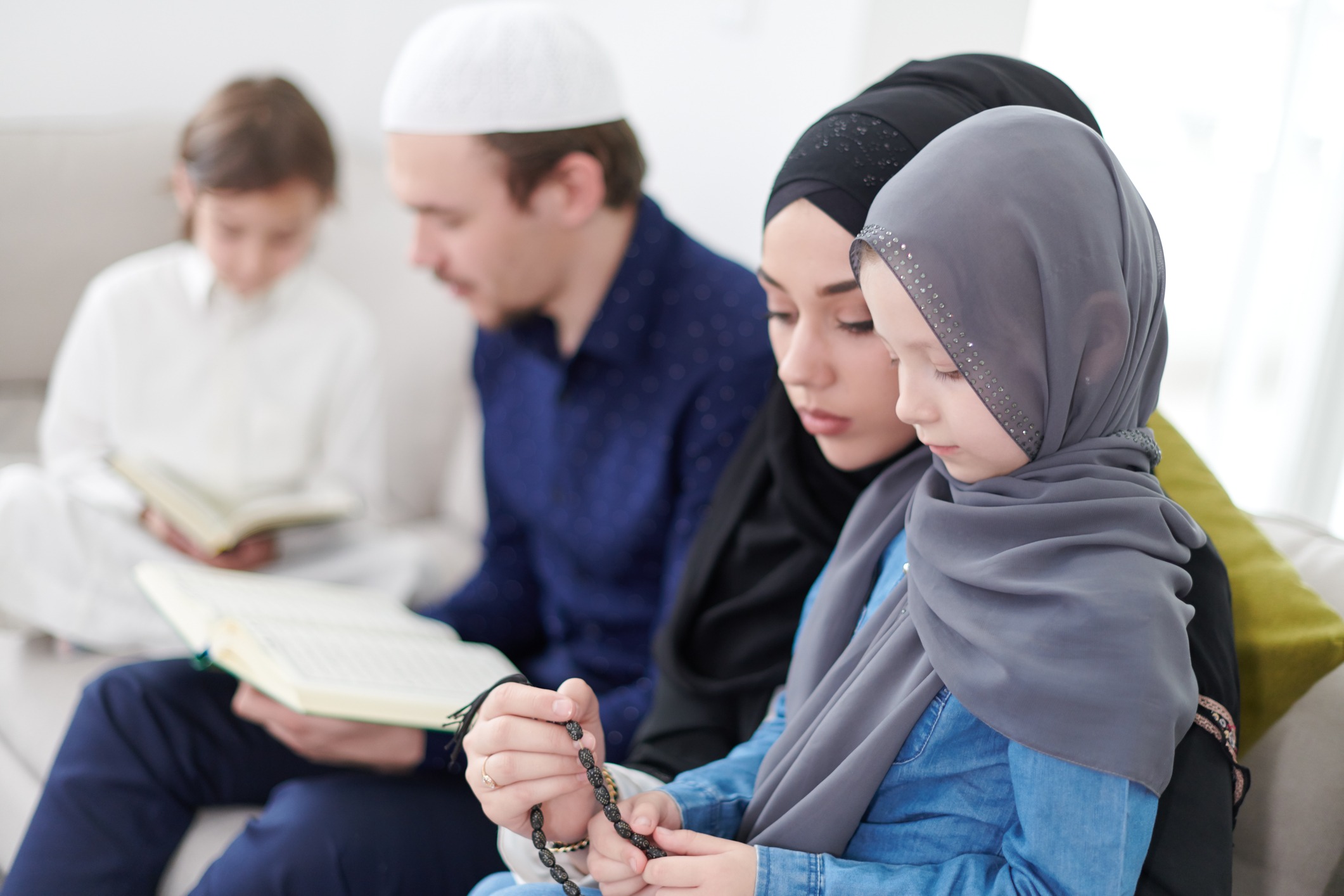a
Abd (عبد 'Abd)
servant, slave. Muslims consider themselves servants or slaves of God. The name Abdallah literally means Servant of God. Abd is often used as a first name in combination with one of the names of God.
Adab (أدب 'Adab)
often used in the sense of etiquette, as politeness is a form of adab.
Ahad (أحد 'Aḥad)
literally one. Within Islam, this word is seen as one of the 99 Beautiful Names of God, because God is seen as the One.
Ahkam (أحكام 'Aḥkām)
rules drawn up according to the Quran and the Sunnah with 5 degrees: fard, mustahab, halal, makruh, and haram.
Ahl al-Bayt (أهل البيت 'Ahl al-Bayt)
the members of the House of Mohammed.
Ahl al-Fatrah (أهل الفترة, ahlu-l-fatratu)
people who are ignorant about Islam.
Ahl al-Kitab (أهل الكتاب 'Ahl al-Kitāb)
People of the Book, the people who believed in God and received a Book before the arrival of Mohammed: Jews, Christians and Hanifs.
Akhirah (آلآخرة Al-'Ākhirah)
life after death and the accountability one takes for his or her actions.
Akhlaq (أخلاق 'Akhlāq)
Demonstrating virtues in practice.
Alamien (عالمين 'Ālamīn)
all that exists, including man, the jinn and the angels.
Alhamdulillah (الحمد لله Al-Ḥamdu li-l-Ḷāh)
All Praise is for God; God be praised
Allah (الله)
God
aAllahumma (اللَّهُمَّ)
Oh God.
Allahu akbar (الله أكبر Al-Ḷāhu 'Akbar)
God is the greatest.
Alim (عالم 'Ālim)
He who knows, plural Ulema
Amanah (أمانة 'Amānah)
the trust that man received from God and thus free will.
Ameen (آمين 'Āmīn)
Amen, meaning O God, hear our prayers!
Aminah bint Wahab (آمنة بنت وهب)
the mother of Muhammad.
Ansaar (أنصار Anṣār)
“Helpers”, the inhabitants of Medina who converted to Islam, who helped the Muslims from Mecca after the Hijrah.
Aqidah (عقيدة 'Aqīdah)
the pillars of faith, the testimony of Islam, for Sunnis consisting of six pillars: belief in the unity of God, the angels, the revealed Books, the prophets and the messengers, the Resurrection and the Last Day and the predestination of God.
Arkan (ركن/أركان)
the five pillars of Islam: the testimony of faith, the ritual prayers, alms-giving, fasting during Ramadan and the pilgrimage to Mecca.
Ashura (عاشوراء 'Āshūrah)
tenth day of the month of muharram; the day on which the Sunnis remember that God saved the prophet Musa and the children of Israel from Egypt. Shiites commemorate the death of Imam Hussein.
Asharatu Mubashshirun (العشرة المبشّرون)
the ten companions of Muhammad who are promised a place in Paradise.
Asr (العصر Al-'Aṣr)
the afternoon prayer that is part of the five-times daily salat.
As-Salamu Alaykum (السلام عليكم As-Salāmu 'Alaykum)
literally: peace be with you, greeting that Muslims use among themselves
Astaghfirullah (أستغفر الله 'Astaghfiru l-Ḷāh)
I seek forgiveness from God., expression
Awdhu billah (أعوذ بالله 'A'ūdhu bi-l-Ḷāh)
I take refuge in God, expression.
Awliya' (أولياء 'Awliyā')
friends, protectors, helpers (singular: wali)
Awrah (عورة 'Awrah)
the part of the body that needs to be covered.
Aya (آية 'Āyah) (plural ayaat, آيات)
a sign, more specifically, a portion or verse of the Qur'an
Ayatollah (آية الله 'Āyat al-Ḷāh)
literally: Sign of God, title for high-ranking clerics within Shiism;
Azan (أذان Ādhān)
the call to ritual prayer by the muezzin.
Azl (عزل 'Azl)
coitus interruptus, literally: isolation
b
Baitullah (بيت الله)
House of God, a mosque or also the Kaaba.
Barakah (بركة)
a blessing, also the spiritual transmission of knowledge
Barzakh (برزخ)
period between a person's death and his resurrection on the Day of Judgment. It is seen as a kind of sleep state.
Bid'ah (بدعة)
literally: something new. In Islam it is an innovation in faith or worship. This is strictly forbidden in Islam.
Bint (بنت)
daughter of
Bismillah ar-Rahman, ar-Raheem
In the name of God, the Gracious, the Most Merciful, expression and the first ayah of all the surahs of the Quran except one.
c
Choel
the 'incompatibility of characters' between a man and a woman, which is a valid reason for divorce.
D
Dajjaal (دجّال)
literally: liar, figure within Islam, comparable to the Antichrist.
Dar al-amn (دار الأمن)
translated as house of safety, refers to Muslims living in the Western world.
Dar ad-dawa (دار الدعوة)
translated as house of invitation, refers to areas where Islam has recently been introduced.
Dar al-harb (دار الحرب)
translated as house of war, refers to the countries that are not part of the Islamic world.
Dar al-Islam (دار الإسلام)
translated as house of peace, refers to the countries that are part of the Islamic world.
Darud
a little blessing spell
Dawah (الدعوة)
invitation to convert to Islam
Dervish (درويش)
Islamic mystic, used in Sufism.
Dhabiha (ذَبِيْحَة)
term for indicating the method of slaughter prescribed by Islam.
Dhikr (ذكر)
memory of God, particularly strongly developed within Sufism.
Dhimmi (ذمّي)
resident of an Islamic country who is not a Muslim. Initially, dhimmis were only understood as the so-called 'people of the Book'.
Dhuhr (الظهر)
the afternoon prayer that is part of the five times daily salat
Deen (الدين)
the Way, a way of life, often used to refer to Islam, but also to the other Abrahamic religions.
Djenna (جنة)
Paradise, place where those who believe in Allah and the Last Day go after their death.
Jinn (جن)
invisible being, mentioned in the Quran, that can possess people.
Djuz' (جزء)
one-thirtieth part of the Koran.
Dua (دعاء)
personal prayer (supplication) for which there are no rules and which is not obligatory.
Dunya (دنيا)
the world or life, as opposed to the hereafter.
E
Eid (عيد)
Party
Eid ul-Adha (عيد الأضحى)
Feast of Sacrifice. It is celebrated in memory of the prophet Ibrahim, who was willing to sacrifice his son on behalf of God.
Eid ul-Fitr (عيد الفطر)
Sugar festival. The end of fasting during the month of Ramadan is celebrated.
Emir (أمير amīr)
literally: commander, captain, noble or regal title used in Islamic countries in the Middle East and North Africa.
F
Fajr (فجر)
the morning prayer that is part of the five-times daily salat.
Fard (فرض)
religious duty, a category of fiqh: one is punished for neglect.
Fatwa (فتوى)
is a legal opinion in Islam issued by a religious law specialist regarding a specific issue.
Fiqh (فقه)
Sharia jurisprudence. Literally this means having a good insight into something, knowing and understanding what something means.
Fi sabil Allah (في سبيل الله)
in the path of God, (for God's sake) expression
Fitna (فتنة)
period of chaos, likewise the time of apocalypse or trial.
Fitra (فطرة)
comparable to the awareness of good and evil, the conscience. Muslims believe that children are born predisposed to this gift.
G
Ghusl (غسل)
Large ritual washing that is performed by Muslims in certain cases
H
Hadath akbar (حدث أكبر)
Major ritual impurity
Hadath asghar (حدث أصغر)
Minor, ritual impurity
Hadd (حد)(plural حدود hudūd)
Literally: boundary, within Islam the boundary that God gave to man. Transgression is punished based on the Quran.
Hadith (حديث) plural
Hādīth: the Islamic traditions about the doings and sayings of Muhammad. Through these traditions one knows the sunnah, the way of the prophet. For the vast majority of Muslims, the Ahadith complement the Quran.
Hajj (الحجّ)
The pilgrimage to Mecca, one of the five pillars of Islam for Sunnis.
Hafiz (حافظ)
Literally: guardian, within Islam someone who knows the Koran by heart.
Halal (حلال)
clean, permitted, a category from fiqh: one is not punished for these actions, but nor rewarded.
Hanif (حنيف)
Literally 'pure'. Someone who already adhered to a monotheistic faith before the origins of Islam, such as Ibrahim (Abraham) and Isa (Jesus).
Haqq (حق)
Truth, one of God's Beautiful Names.
Harakat (حركات)
Literally: movement, the placement of vowel signs in an Arabic text.
Haram (حرام)
Unclean, a category of fiqh: forbidden
Hasan (حسن)
Good, nice. Also a categorization of a Hadith that is acceptable.
Hidaya (هداية)
Guidance (by God)
Hijab (حجاب)
Literally covering, within Islam: headscarf, worn by women.
Hijrah (الهجرة)
The migration of Muhammad and his followers from Mecca to Medina in 622. Beginning of the Islamic calendar.
Hizb (حزب)
Half of a djuz', one sixtieth of the Qur'an
Hurri (حورية hūrīya, plural hūrīyāt (حوريات))
Beautiful, young boys and girls who will serve the believers at their beck and call in Paradise.
I
Ibadah (عبادة)
Worship is expressed not only in rituals, but in all good deeds, such as alms or modesty.
Iblis (إبليس)
A disobedient jinn (not an angel, see Surat al-Kahf 50), banished to hell, also known as Satan.
Ifriet (عفريت)
A type of jinn in Arabic mythology
Iftar (إفطار)
Meal after sunset, during the fasting month of Ramadan.
Ihram (إحرام)
Condition of cleanliness during the hajj, the pilgrimage to Mecca. There are dress codes for this.
Ihsan (إحسان)
Perfection in worship, as if one sees God. God sees everything that needs to be taken into account.
Ijaz (إعجاز)
Non-imitability and the uniqueness of the Qur'an.
Ijma (إجماع)
Consensus of legal scholars, one of the four sources of fiqh, the jurisprudence of Islamic law
Ijtihad (إجتهاد)
Reason, one of the complementary principles to the four sources of fiqh, the jurisprudence of Islamic law. The 'gates of ijtihad' were declared closed to most Muslims in the 10th century.
Ilah (إله)
God, not necessarily God
Imam (إمام)
A leader in the salat, the ritual prayer. For Shiites it is a spiritual leader with Divine inspiration who has authority for tafsir, Qur'anic exegesis.
Iman (إيمان)
The belief that someone has for themselves.
Indjil (الإنجيل)
One of the books of revelation that is spoken of with respect in the Quran. Injil is usually equated with the Gospel, but the content of the Injil is not known from the Quran. Revealed to Isa.
Insha'Allah (إن شاء الله)
by God's will!, expression.
Iqamah (إقامة)
The second call to salat, almost identical to the azan.
Isa (عيسى)
The son of Maryam. Isa is mentioned in the Quran as an important prophet and messenger of God. According to Muslims, Isa has no father and, unlike in Christianity, he is therefore not seen as the son of God.
Isha (عشاء)
The night prayer that is part of the five-times daily salat
(al-)Isra (الإسراء Al-'Isrā')
The Night Journey of Mohammed, also the name of a surah, Surah The Night Journey.
Islam (الإسلام)
Surrender to God. The root word means surrender, peace, obedience and purity.
Isnad (إسناد)
A complete chain of narrators who may have known and met each other, a prerequisite for an authentic Hadith.
Israel (الإسراء)
Part of the Night Journey in which Mohammed went from Mecca to the site of the current Al-Aqsa Mosque in Jerusalem.
J
Jadid (جديد)
Literally: new, the name given to Islamic reformers within the Russian Empire in the 1880s.
Jahannam (جهنم)
Hell
Jahiliyya (الجاهليّة)
Concept referring to the condition of pre-Islamic, polytheistic Arab society, the time of ignorance.
Janaza (جنازة)
Funeral prayer
Jazakallahu Khayran (جزاك الله خير)
May God reward you for doing good. Expression as a sign of thanks.
Jihad (جهاد)
Struggle, protection of faith, is used for both the inner struggle and the outer struggle.
Jizya (جزية)
Tax paid by certain non-Muslims.
Jumah (جمعة)
Dhuhr, performed as a congregational salat on Friday in the mosque.
K
Kaaba (الكعبة)
Square building in Mecca that determines the qibla. The building is not worshipped, but is established as a common point.
Kafir (كافر)
Someone who does not believe in God.
Kalam (علم الكلم)
Islamic theology
Caliph (خليفة Khalīfah)
Literally: successor, head of a caliphate and in particular of the Islamic Empire. The caliph is considered the successor of Muhammad, as leader of the ummah, not as a prophet.;
Khatib (خاطب)
The imam who delivers the khutbah, the sermon, at the communal salat on Friday
Khilafah (خلافة)
The stewardship that God gave man over the earth.
Khutbah (خطبة)
The sermon that an imam delivers during the congregational salat on Friday.
Kitāb (كتاب)
Literally: book, is used as the name for the Koran.
Quran (القرآن)
The most important Holy Book of the Muslims, revealed to Muhammad in 610.
L
La ilaha illallah (لاإله إلا الله)
There is no deity but God. The most important expression within Islam, part of the shahadah and therefore part of the five pillars of Islam and the message of tawhid and therefore part of the pillars of faith.
Laylat al-Qadr (ليلة القدر)
Night of decision, the night in which a surah of the Koran was revealed to Mohammed by the angel Jibril for the first time.
M
Madhhab (مذهب)
(plural madhahib) school of law, mainly known within Sunni Islam, which interprets Muslim law in different ways, called fiqh.
Madrasah (مدرسة)
School, a religious school within Islam.
Maghrib (مغرب)
The evening prayer that is part of the five-times daily salat.
Mahdi (مهدي)
Guide, person who in some Islamic movements is expected to come to the end of time according to prophecies. The arrival of the Mahdi is the most important thing that will happen on Judgment Day and is an eschatological symbol.
Mahram (محرم)
A family member of the opposite sex who falls within the protected boundaries; one cannot marry this.
Makruh (مكروه)
A category of fiqh, one is not punished for doing these actions, but for not doing so one is rewarded.
Malaikah (ملائكة)
Angels
Mandub (مندوب)
A category of fiqh, one is not punished for omission, but is rewarded in the afterlife. This could include voluntarily giving alms or performing extra prayers.
Manzil (منزل)
One-seventh part of the Quran of approximately equal length.
Masha Allah (ما شاء الله)
God willed it, expression.
Masih (مسيح)
Messiah, also the addition to Jesus' name.
Masjid (مسجد)
Literally: place of prostration, mosque
Ma'sum (معصوم)
Free from sin; children are ma'sum, but adults can also be ma'sum, as is believed of Muhammad.
Medina (مدينة)
City; al-Madinat-un-Nabi means the city of the Prophet.
Mihrab (محراب)
Prayer niche in a wall in the mosque indicating the direction of prayer, the qibla.
Minaret (منارة)
The tower of a mosque, typical Islamic architectural feature.
Minbar (منبر)
Pulpit in the mosque where the imam delivers a number of blessings and the sermon, the khutbah, during the congregational prayer on Friday.
(al-)Miraj (المعراج)
Part of the Night Journey in which Mohammed went from the site of the current Al-Aqsa Mosque in Jerusalem to heaven and visited the seven Heavens.
Mufti (مفتى)
A legal advisor in Islamic law, when fiqh is not sufficient. The ruling is called a fatwa.
Mullah (ملا)
Cleric who has intensively studied the Quran, Ahadith and fiqh.
Muslim (مسلم)
One who has submitted to God, professing Islam
Mu'awwidhatayn (المعوذتين)
Surah Humanity and Surah The Breakthrough are known as Mu'awwidhatayn, in which refuge is sought to God.
Mubah (مباح)
A category of fiqh, one is not punished for these actions, but also not rewarded, neutral (also called halal).
Mubaligh (مبلغ)
Someone who can recite the entire Quran by heart.
Muezzin (مؤذن)
Muslim who traditionally calls for salat from a minaret at a mosque.
Muhammadun rasulullah (محمد رسول الله)
Muhammad is the messenger of God. The important expression within Islam, part of the shahada and therefore part of the five pillars of Islam;
Muhajirun (مهاجرون)
The first Muslims to emigrate from Mecca to Medina (hijra).
Mu'min (مؤمن)
Truly devout Muslim
Munafiq (منافق)
Hypocritical, Muslim who pretends to be Muslim, but does not believe.
Munkar (منكر)
One of the two angels who will test a deceased person's faith in his or her grave
Murtad (مرتد)
Apostate, Muslim who distances himself from Islam (renunciation).
Mustahabb (مستحبّ)
A category of fiqh, one is not punished for omission, but is rewarded in the afterlife. This could include voluntarily giving alms or performing extra prayers.
N
Nabi (نبي)
Literally: prophet, within Islam a distinction is made between nabi who did not bring a Holy Book and between a rasul who did bring a Holy Book.
Nakir (نكير)
One of the two angels who will test a deceased person's faith in his or her grave
Naskh (ناسِخة)
Technical term from Quranic scholarship relating to the derivation of legal regulations. It concerns the abrogation and replacement by God of certain ayat of the Quran.
Nikab (نقاب)
Garment that is mainly worn by (strict) Islamic women. A niqab is often confused with a burqa.
Nur (نور)
Light, the stuff of which angels are said to be made; also a surah from the Koran: Surah The Light.
O
Ulema (علماء)
Translated 'scholars', those who have immersed themselves in knowledge related to Islam, for example in Sharia, hadith and fiqh.
Ummah (الاُمّة)
The global Islamic community.
Umrah (عمرة)
Pilgrimage to Mecca which, unlike the Hajj, can be made all year round.
Q
Qadar (قدر)
Destiny, Divine predestination, one of the pillars of faith.
Qadi (قاضي)
Judge who judges on the basis of Sharia and Ijma.
Qari (قارئ)
Someone who can recite the entire Quran by heart
Qibla (قبلة)
including the direction of prayer for the salat, but also in the grave one lies on the right side facing the qibla and the qibla also plays a role in the dhabiha.
Qi'yaamah (قيامة)
Resurrection, also a surah from the Koran: Surah The Resurrection.
Qiyas (القياس)
Analogy, the derivation of rules for situations that are not described in the Quran and the Sunnah by analogy from comparable situations that are described. It is one of the four sources of fiqh, the jurisprudence of Islamic law
Qur'an
See Quran
R
Rabb (رَبِّ)
Lord, master.
Rahman (رحمان)
Merciful; Ar-Rahman is one of the 99 Beautiful Names of God
Rahim (رحيم)
Merciful; Ar-Rahim is one of the 99 Beautiful Names of God;
Raka'a (ركعة)
Certain part of the salat that is performed several times. The number of rak'at varies per prayer.
Rasul (رسول)
Messenger and prophet; a distinction is made between a nabi who did not bring a Holy Book and a rasul who did bring a Holy Book. The belief in the rasul is one of the Pillars of faith.
Riba (ربا)
Interest, receiving and giving interest is prohibited, as stated in the Quran.
Ridda (ردة, ridda)
Apostasy
Risalah (رسالة)
Literally a message, within Islam it is a Divine message. Al-Risalah, 'The Message' is also the name of a film about the life of Mohammed
Rooh Al-Qudoes (الروح القدس)
Divine spirit
Ruh (روح)
Soul
Ruk'u (رُكوع)
Part of a ra'ka of salat where one stands, bows and kneels.
S
Sadaqah (صدقة)
Alms given in addition to the obligatory zakat.
Sahaba (صحابة)
Companions of Muhammad, singular sahābi is also used as friend.
Sadjada (سجادة)
Prayer rug for ritual prayer
Sahoor (سحور)
Breakfast during the fasting month of Ramadan, before Fajr.
Salaf (سلف)
Ancestors, usually denotes the first three generations of Muslims from the time of Muhammad. Salafism takes its name from this.
Salam (سلام, salām)
Peace, also used as a greeting
Salat (صلاة)
The five-times-daily ritual prayer, one of the five pillars of Islam.
Sallallahu alaihi wa sallam (صلى الله عليه و سلم)
God's blessing and peace be upon him, expression of reverence, used after hearing, saying or writing the name of Muhammad, abbreviated as “ص” or saws or the Dutch pbuh, sometimes also zvmh.
Salsabil (سلسبيل)
Heavenly river
Sawm (صَوم)
Fasting during the month of Ramadan.
Shaikh (شيخ)
Sheikh, title given in the Arab world to a man who has or has acquired prestige as a leader, both spiritually and temporally.
Shahada (الشهادة)
The statement: La ilaha illa Allah. Muhammadun rasulullah. (There is no deity but God and Muhammad is His messenger.), testimony, one of the five pillars of Islam and closely related to the Pillars of Faith;
Shahid (شهيد)
Martyr
Sharia (شريعة)
Literally path to the well, within Islam the Islamic law based on the Koran and the Sunnah, the basis of fiqh.
Sharif (شريف)
Title intended for the descendants of Mohammed through Hassan, son of Mohammed's daughter Fatima Zahra and his son-in-law Ali ibn Abi Talib.
Shaitan (شيطان)
Satan, also called Iblis.
Shi'a (شيعة)
Muslim who believes according to the Shia way.
Shirk (شرك)
Equating something or someone with God, the greatest sin in Islam
Sira (السيرة)
The life or a biography of the life of Muhammad.
Sirat al-Mustaqim (صِّرَاطَ المُستَقِيمَ)
The Straight Path, as also mentioned in Surah The Opening.
Subhanahu wa ta'ala (سبحانه و تعالى)
The most exalted and exalted expression used after hearing, saying or writing the name of God in Arabic, Allah.
Subhan'Allah (سبحان الله)
Praise be to God, expression used by Muslims when expressing strong feelings or relief.
Sudjud (سُجود)
Part of a ra'ka of salat in which one touches the ground with the palms, knees, feet and face, nose and forehead
Sufi (صوفي)
Muslim who believes according to the Sufi way.
Sunnah (السنّة)
In the sense of path or example, best given by Muhammad or in the sense of recommended, a category of fiqh.
Sunni (سنّي)
Muslim who believes according to the Sunni way.
Sura (سورة)
A chapter from the Quran. There are a total of 114 surahs.
T
Tafsir (تفسير)
Exegesis / Explanation of the Quran
Tasawwoof (الصوفية)
Mystical movement whose followers (dervishes) describe it as the heart, core and essence of Islam
Taghut (طاغوت)
Can be translated as something that crosses the line. It is a form of superstition, just like shirk.
Tahajjud (تهجد)
Optional night prayers, such as witr
Taharah (طهارة)
Ritual cleansing by wudu or ghusl
Tahir (طاهر)
Ritual clean
Tahrif (تحريف)
Forgery, corruption. Muslims assume that, except the Quran, the other Islamic Holy Books are not purely transmitted and suffer from tahrif.
Tauwid (تجويد)
A special way of reciting the Koran almost melodiously.
Takbir (تكبير)
expression of God's greatness through the utterance of Allahu akbar.
Takfir (تكفير)
Declaring a believer or a group of believers as kafir (unbeliever).
Takiyya (تقيّة)
In the Islamic tradition of Shiites, Ishmaelites and Druze, fear, caution, is a permissible rule of conduct to conceal the faith under threat or coercion.
Talaq (طلاق)
Divorce, the rejection of a Muslim woman by her husband.
Taqwa (التقوى)
To be aware of God's omnipresent presence.
Tarawih (تراويح)
Extra salat, performed after isha during the fasting month of Ramadan.
Tartil (ترتيل)
A special way of reciting the Koran almost melodiously.
Tasbih (تسبیح)
Prayer beads
Tasleem (تسلم)
Peace greetings at the end of the salat
Tawaaf (طواف)
Tour of the Kaaba that is part of Umrah and Hajj
Tawheed (توحيد)
Literally making one, within Islam an indication of the 'unity of God' and monotheism. God is one: completely indivisible, completely unique and completely indefinable. 'Tawhid' is usually considered one of the pillars of faith.
Tawrat (توراة)
One of the books of revelation that is spoken of with respect in the Quran. The Book is usually equated with the Torah, but the contents of the Tawrat are not known from the Quran. Revealed to Moses.
Tayammum (تيمم)
Ritual ablution performed without water, unlike wudu or ghusl
YOU
Urf (عرف)
Customary law, one of the additional principles to the four sources of fiqh, the jurisprudence of Islamic law.
Usul al-Fiqh (أصول الفقه)
Study of fiqh.
W
Wahy (وحي)
Revelation of God
Wajib (فرض واجب)
Religious duty, a category of fiqh: one is punished for neglect.
Wali (والي)
Friend, helper, protector, master (not to be confused with Wāli)
Waqf (وقف)
Religious foundation according to Sharia
Witr (وتر)
Voluntary salat during the night, between isha and fajr, consisting of 3 rakaat
Wudu (وضوء)
Minor ablution performed by a Muslim before salat.
Y
Yawm (يوم)
Day
Ya Allah (يا الله)
Oh God! Expression
Yawm Al-Qi'yaamah (يوم القيامة)
Judgement day
Z
Zabur (زبور)
Many scholars have equated it with the Psalms and, according to the Koran, one of the holy books, it was revealed to David.
Zakat (زكاة)
'cleansing' in the form of obligatory alms to the poor to achieve a more equitable distribution of goods. It is one of the five pillars of Islam.
Zina (زنا)
Sexual activity outside of marriage is prohibited in Islam.
Zohr (ظهر)
Afternoon prayer.





